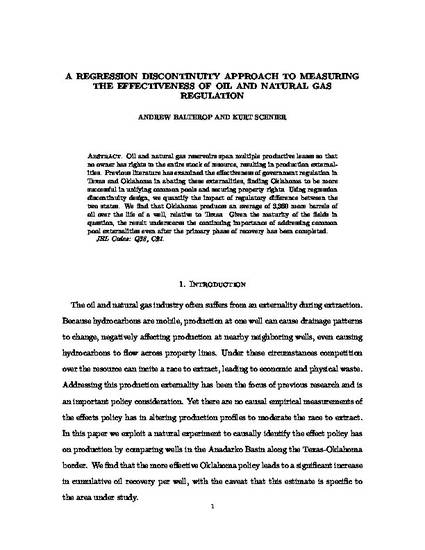
Article
A REGRESSION DISCONTINUITY APPROACH TO MEASURING THE EFFECTIVENESS OF OIL AND NATURAL GAS REGULATION
Resource and Energy Economics
(2016)
Abstract
Oil and natural gas reservoirs span multiple productive leases so that
no owner has rights to the entire stock of resource, resulting in production externalities.
Previous literature has examined the e↵ectiveness of government regulation in
Texas and Oklahoma in abating these externalities, finding Oklahoma to be more
successful in unifying common pools and securing property rights. Using regression
discontinuity design, we quantify the impact of regulatory di↵erence between the
two states. We find that Oklahoma produces an average of 3,360 more barrels of
oil over the life of a well, relative to Texas. Given the maturity of the fields in
question, the result underscores the continuing importance of addressing common
pool externalities even after the primary phase of recovery has been completed.
Keywords
- oil,
- natural gas,
- regression discontinuity,
- common pool
Disciplines
Publication Date
Spring May 1, 2016
Citation Information
Andrew Balthrop and Kurt E. Schnier. "A REGRESSION DISCONTINUITY APPROACH TO MEASURING THE EFFECTIVENESS OF OIL AND NATURAL GAS REGULATION" Resource and Energy Economics Vol. 44 (2016) p. 118 - 138 Available at: http://works.bepress.com/andrew-balthrop/1/
